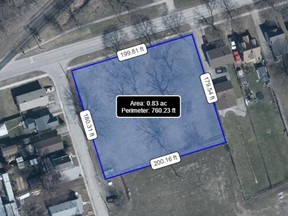Chatham-Kent council will consider a proposed location for emergency transitional cabins for the homeless on Monday.

Chatham-Kent council will consider a proposed location for emergency transitional cabins for the homeless on Monday.
Advertisement 2
Article content
The municipal staff recommendation, released Thursday, follows council’s direction in January to replace the municipally run Victoria Park Place homeless shelter with 50 cabins.
Article content
In a report, staff recommends the cabins be erected on municipal land at 378, 390 and 392 Park St. in Chatham.
They also call for hiring of a project manager on a two-year contract to assist with this project and current and future municipal housing affordable developments. The $264,000 cost would be funded from reserves.
If approved, staff would begin pre-site development work at the site, including drawings and servicing up to $500,000.
Municipal staff would run the site, providing 24/7 case management focusing on securing community housing, life skills training and community referrals.
Advertisement 3
Article content
“Administration is working to replace emergency shelter operations with an emergency transitional housing solution that includes the purchase of individual cabins,” the report said. “This model will have a positive impact on the lives of the people who need this program now and . . . in the future.
“This program will be treated like other forms of affordable housing, including similar expectations, controlled entry and independent living,” it added.
Council had set guidelines for staff, barring sites:
- Next to elementary schools, splash pads, wading pools or licensed child care centers
- In or next to parks
- Within residential neighborhoods
Moving the program out of Chatham would add transportation costs, reduce participation and limit community efforts to cut homelessness, the staff report said. “It is also expected that the prevalence of encampments would grow at a faster rate than they already are.”.
Advertisement 4
Article content
More than 25 Chatham sites were reviewed for the transitional cabin program.
“While this location is at the end of a residential neighborhood, given its proximity to Park Avenue East (250 meters), staff are not concerned that the site would be inaccessible to those who will be temporarily living here,” the report said.
There is a park about 200 meters away, separated by railway tracks and a natural tree barrier. There are no schools, licensed child care centers or splash pads in the vicinity, which has “limited neighbors and is close to a main road, which is important to support future participants’ privacy.”
Last year, staff helped 256 people who were experiencing or at high risk of homelessness find housing.
Advertisement 5
Article content
Staff will include the selected location in a request for proposals to inform potential proponents, attract a wide range of proposals and ensure a competitive process by comparing different vendors’ offerings, approaches and prices.
Several interested modular housing developers, including local companies, already have reached out to municipal staff
“Staff have heard from neighborhood associations and some business groups that this type of housing, as well as supportive housing, should be located outside of town or within an industrial area away from others,” the report added.
“Administration is confident that doing so would prove counterproductive, as the people who need this service would be unable to access it. This is demonstrated by the low wait lists for community housing in some of the outlying communities. Public transportation and access to services are essential considerations for housing developments.”
Advertisement 6
Article content
The cabin program alone won’t end homelessness, addictions, mental illness or crimes of survival, staff said, but it will improve lives, reduce emergency room visits, facilitate referrals and provide a “critical starting point” to offer people dignity and the chance to change.
The report also touched on potential human rights implications related to housing and services for marginalized groups.
“Ontario Human Rights Commission (staff). . . endorsed administration from making recommendations that could potentially breach citizens’ charter rights or human rights, specifically ‘people zoning’ or the practice of approving or denying a service based on the people who access this service,” the report said.
Advertisement 7
Article content
“If an area would be suitable/approved for residential housing, then it should not be denied for another type of residential housing based on the people who would be residing at that location.”
Staff have not consulted neighbors of the proposed site, saying it was important to inform council before initiating community consultations.
“Through working with multiple realtors, and reviewing dozens of properties, staff are of the opinion that this is the best location based on accessibility, cost and ability to meet timelines,” the report said.
“Staff plan to connect with direct neighbors to discuss the program and hear their concerns on an ongoing basis.”
“What is often heard is that more needs to be done, but there is never consensus on location,” the report added. “What is also clear, and is demonstrated daily in every community across the country, is that homelessness is growing largely as a result of the reduction of affordable housing.”
Article content